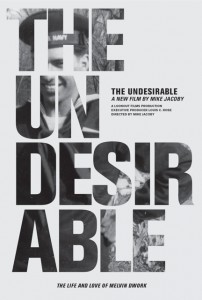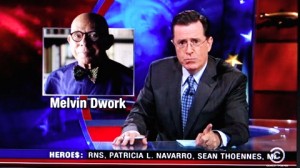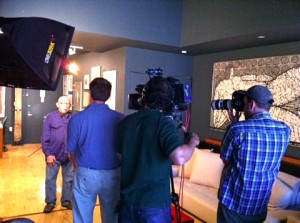Filmmaker Michael Jacoby Talks To New England Post About ‘The Undesirable’
Posted by Soren Sorensen Two weeks ago, the official end to the policy known as Don’t Ask Don’t Tell (DADT), which banned gays and lesbians from serving openly in the military, was perhaps seen by some gay rights supporters as too little too late. For those supporters, however, it was a victory nonetheless. Others, specifically the current field of Republican presidential nominees, see it as quite a significant setback.
Two weeks ago, the official end to the policy known as Don’t Ask Don’t Tell (DADT), which banned gays and lesbians from serving openly in the military, was perhaps seen by some gay rights supporters as too little too late. For those supporters, however, it was a victory nonetheless. Others, specifically the current field of Republican presidential nominees, see it as quite a significant setback.
Rick Santorum, one candidate who’s been unhappy recently with the level of media coverage he’s been receiving, called the repeal of DADT “social experimentation” and “tragic.”
“Sex is not an issue,” he said at last month’s GOP debate in Florida to rapturous applause. His comments came after several audience members booed Stephen Hill, a gay soldier serving in Iraq who submitted a question about DADT via YouTube.
“We would reinstitute that policy if Rick Santorum was president,” Santorum said of himself in the third person. Given Santorum’s poll numbers, it’s not likely that that day will ever come.
For filmmaker Michael Jacoby, the repeal of DADT means a happy ending for his latest documentary, The Undesirable. Currently in production, the film tells the story of Melvin Dwork, a WWII Veteran who was tossed out of the United States Navy’s Hospital Corp in 1944. The phrase “undesirable discharge” hung over Mr. Dwork for almost 70 years until his record was cleared earlier this year, another happy ending for Mr. Jacoby’s film.
Mr. Jacoby, whose previous effort was Ten More Good Years, a film about lesbian, gay, bisexual and transgender aging issues, talked to New England Post this week about progress on The Undesirable.
NEP: When did you get the idea for The Undesirable and what’s your connection to Melvin Dwork?
 MJ: I met Mel fifteen years ago when I first moved to New York City from Los Angeles. I got a job working at a little restaurant in the village called Pearl Oyster Bar. At the time it was a tiny restaurant with only counter seating—sort of like working behind a bar. Because there was so much face-to-face with regulars, I got to know Mel. He came in quite often and had a lot to talk about. We eventually became friends and now consider each other family. Throughout the course of our relationship we learned more and more about one another and it didn’t take long before I learned about Mel’s life as a young man. When he told me he had served in the Navy as a Hospital Corpsman I had a ton of questions for him. My grandfather was a Marine during WWII and I learned quite a bit about that war through him and his storytelling. Because I am gay, I had always wondered what it must have been like for gay service members at that time. Most men who survived The War returned to their families proud, victorious and honored. Men like Mel, undesirably discharged for being homosexual, had to return to their families and either come out to them at a time when no one did such a thing, or decide to lie about it. Mel told the truth and found that his family did not care. Most men were not so lucky. Since his discharge in 1944 Mel has been trying to clear his record. Nearly 70 years later he can finally say that he is as honorable as any of the service men or women that he served with.
MJ: I met Mel fifteen years ago when I first moved to New York City from Los Angeles. I got a job working at a little restaurant in the village called Pearl Oyster Bar. At the time it was a tiny restaurant with only counter seating—sort of like working behind a bar. Because there was so much face-to-face with regulars, I got to know Mel. He came in quite often and had a lot to talk about. We eventually became friends and now consider each other family. Throughout the course of our relationship we learned more and more about one another and it didn’t take long before I learned about Mel’s life as a young man. When he told me he had served in the Navy as a Hospital Corpsman I had a ton of questions for him. My grandfather was a Marine during WWII and I learned quite a bit about that war through him and his storytelling. Because I am gay, I had always wondered what it must have been like for gay service members at that time. Most men who survived The War returned to their families proud, victorious and honored. Men like Mel, undesirably discharged for being homosexual, had to return to their families and either come out to them at a time when no one did such a thing, or decide to lie about it. Mel told the truth and found that his family did not care. Most men were not so lucky. Since his discharge in 1944 Mel has been trying to clear his record. Nearly 70 years later he can finally say that he is as honorable as any of the service men or women that he served with.
NEP: Was Mr. Dwork always interested in the idea of having part of his life immortalized in a documentary film or did he take some convincing?
MJ: Mel had no problem with the idea of being in a documentary about his life. We had been talking about trying to make a narrative film for some time, but eventually settled on a documentary format. Perhaps one of the reasons Mel was so open to the idea of being in a film is because he helped inspire my last feature documentary, Ten More Good Years. He knows that if I set out to make a film it will happen. It isn’t just talk. He wants his story to be told in order to inspire others so that they may “right the wrong” and set their own records straight. I think he is confident in my ability to make sure that happens.
NEP: How much of the film have you completed and how is fundraising going?
MJ: I am currently shooting all of Mel’s interviews. This is the easy part. I have been fortunate enough to find a sound stage in New York called Pirate Audio to shoot Mel’s interviews in. I had done some voiceover work there in the past and they were kind enough to offer me an incredible rate for use of one of their studios simply because they were very engaged by the story. Making a documentary independently is very difficult if you cannot find people like the guys at Pirate or are not able to raise the cash. I am raising money now via a non-profit arts organization here in NYC called Fractured Atlas. Any money donated to the film is tax deductible as FA is a 501c3. FA then follows exactly how I spend the money to make sure it is going strictly towards the making of the film. Now, saying all that, I have only been able to raise about $2,500.00 so far. I need to raise about $200,000.00 to make this film from start to finish.
NEP: Did the official repeal of DADT increase interest a bit?
 MJ: The repeal of DADT did indeed raise interest in the film, I think mainly because the repeal of Mel’s own “undesirable” status to “honorable” status by the Pentagon happened just one month prior to the DADT repeal. The Associated Press broke Mel’s story the Friday before the repeal of DADT and it quickly became their biggest story with over 200 news outlets picking it up. I think it was natural for reporters to put the two stories together even though they had nothing to do with one another. The timing seems to have been nothing more than a coincidence. These stories did drive people to my website and I can see that views of the trailer skyrocketed. While I have had plenty of positive comments and request for interviews I have not seen an uptick in tax deductible donations. (sad face)
MJ: The repeal of DADT did indeed raise interest in the film, I think mainly because the repeal of Mel’s own “undesirable” status to “honorable” status by the Pentagon happened just one month prior to the DADT repeal. The Associated Press broke Mel’s story the Friday before the repeal of DADT and it quickly became their biggest story with over 200 news outlets picking it up. I think it was natural for reporters to put the two stories together even though they had nothing to do with one another. The timing seems to have been nothing more than a coincidence. These stories did drive people to my website and I can see that views of the trailer skyrocketed. While I have had plenty of positive comments and request for interviews I have not seen an uptick in tax deductible donations. (sad face)
NEP: What can people do if they want to donate?
MJ: If your readers wish to contribute to the film they should visit the website at www.TheUndesirable.com and click on one of the donation buttons. They will be taken to the Fractured Atlas secure website for online contributions or given directions on how to make contributions via mail. All donors receive credit in the film and depending on how large the donation is there are gifts involved, as well as more prestigious credits.
NEP: Your last film, Ten More Good Years (2008), did really well at festivals and aired on Sundance Channel and Logo. I think people imagine that filmmakers who achieve critical and popular acclaim like that are just suddenly “in a club,” meaning making a living off your art, in the film business, no looking back. Talk a little bit about the experience of Ten More Good Years and how it met or surpassed your expectations.
MJ: Despite the critical success of the Ten More Good Years it most certainly did not translate into big money. I did license the film to three networks, the two you mentioned and one in Canada. That money went to pay off the debt I incurred while making the film. I decided to retain all distribution rights in order to make more on educational and home sales. I was relatively successful with those sales but have since licensed the film to educational distribution companies in the US and abroad and just last week licensed home use sales of the film to TLA, a distribution company that focuses on LGBT content. It’s too difficult and time consuming to try to market, distribute and make new films all at the same time. Despite knowing that there is little to no money in making documentaries I am here doing it again. As with Ten More Good Years, I know this is a great story. I know people will want to hear it. The main thing that TMGY did for me is I now have something of a reputation as a filmmaker and I do find it easier to get people to listen to me and take me seriously. I’m hoping to partner with a network to make The Undesirable and am currently working on getting pitch meetings together. I’m crossing my fingers for HBO.
NEP: How has your life been changed by TMGY?
MJ: Ten More Good Years changed my life in many ways. While making a film like TMGY I became immersed in the story. It took nearly four years to make that film from start to finish. It’s was a bit like writing a thesis. I became somewhat of an expert on the issues. It affected my life so much that I have recently considered going to graduate school and getting a Master’s Degree in Social Work so that I can work with and around older LGBT adults. I love LGBT history and I love learning about the men and women who paved the way for me so that I can be the open, honest LGBT person that I am today. If I can’t seem to make a living in film in the next year or two, I will most likely go for the MSW. Either way, I’ll be very happy.
NEP: What have you been working on since TMGY?
MJ: Following TMGY the producers at In The Life, an LGBT television series airing on PBS, asked me to come in and consider working on a couple segments for their broadcast. I produced one called The Written Word and another called Aging In A Safe Environment. Following that I directed and produced a short narrative film called With This Ring that was just selected to screen at the 26th annual Fort Lauderdale International Film Festival in late October, early November. The film is an “Official Selection” placing it in competition for Best Short. With This Ring is a cautionary tale of gay marriage and something a little different than viewers might expect. It was a lot of fun to take a break from documentary and work in a more controlled environment; something I hope to do more of.
NEP: In an ideal world would you make a living as a documentary director?
 MJ: In an ideal world I would love to work as both a documentary director and as a narrative film director. Documentaries satisfy my desire to learn about a specific topic and narrative films satisfy my desire to work with a larger crew in a more organized setting. Both types of film are so different, yet from one you can learn a lot about the other.
MJ: In an ideal world I would love to work as both a documentary director and as a narrative film director. Documentaries satisfy my desire to learn about a specific topic and narrative films satisfy my desire to work with a larger crew in a more organized setting. Both types of film are so different, yet from one you can learn a lot about the other.
Mr. Jacoby lives and works in New York, NY and hopes to have finished The Undesirable in 2012. For more information, please visit: www.TheUndesirable.com.
(In the interest of full disclosure I feel I must point out that I composed the original music for Michael Jacoby’s 2008 film, Ten More Good Years. My work as a film composer however does not affect my work as a journalist in any way, shape or form.)
Related posts:
- Phish Bassist Mike Gordon Tells New England Post About Another Side of In
- Mission Accomplished: New England Post Finds an Economist* who Supports Forgiving Student Loan Debt
- Top 3 Winners of the MassChallenge Startup Competition Tell New England Post About Their Experiences (and the Road Ahead)
- MA Treasurer Tells New England Post About the State’s eBay Auction (and how 1-in-10 Bay Staters have Unclaimed Property They Don’t Know About)
- Noam Chomsky Speaks Out About Occupy Movement, Corporations and US Policies in an Exclusive Interview with New England Post
Short URL: http://www.newenglandpost.com/?p=4948








